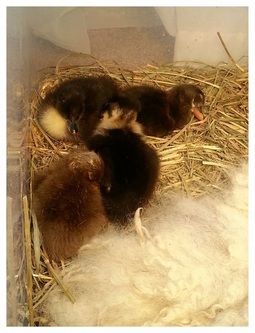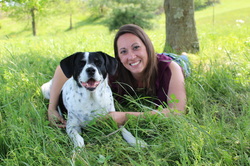
Ducks and geese lay one egg per day; when they have finished laying a clutch the eggs begin to develop. The first chick's uncoordinated struggle sends it careening into the other eggs, signaling them to hatch as well. It's a terrible thing to watch; what seems like such a small and fragile house to us is an armored cocoon whose outer wall and two membranes take a chick up to 40 hours to break down. First, the chick pips (breaks the shell). Minutes or hours later it uses a bump on the end of its beak to crack the shell as it rotates. It must also break through the membranes before the bubble of air within the shell runs out. During this process, the duck absorbs the blood vessels and yolk that surround it and will sustain it for three days after hatching. Birth is arduous, regardless of species.
Zoe and I peeped, chirped, and cheered for our little warrior ducks all weekend. Incubation is an imprecise thing, nothing is better than nature. Though the heat was consistent during incubation, we struggled with humidity. Higher is better, too low and the chick will stick inside the shell. Of course during hatching, high humidity can cause the chick to aspirate (it almost happened to number 4). After losing another duckling in the shell we determined the outer membrane was too thick for them to break through. Hatching became a process of opening the shell with tweezers inch by inch every four hours, stopping when I saw blood or yolk, wetting the membrane to keep it pliable. You have not gambled until you've fought for life, thwarting a natural process and hoping against hope that your efforts will pay off. We might not have tried so hard if our duck hen had lived. First, she'd have done the job herself. Second, we would simply have collected more eggs and tried again. You can play fast and loose with creation when materials are plentiful. In this instance, we felt compelled to succeed. The hen gave her life for this clutch.
Number Four had a particularly rough hatch. After 24 hours, it seemed the duckling was glued in its shell. I made a breathing hole where it had pipped, took it in to speak with its live siblings. Blind and bound, it called out: I am here! They responded, even coming over to peck at the shell. 'You can do it,' they peeped. 'We did, come out and play.' Last yesterday evening the duck stopped breathing. I saw more fluid than had been present and faced a literal life or death dilemma: tear the duck from its shell so it could breathe and hope it wasn't born too early, or leave it to aspirate because chicks have to hatch on their own. I peeled shell and membrane back until blood and yolk began to ooze out. Then I held the egg upside down. The duck squirmed and shuddered back to life. It was touch and go until dawn; having emerged without further assistance, the little duck shivered in birth goo. I didn't expect it to be alive this morning, but it is as strong and happy as the other three. Worth it.
Zeke loves the new ducks, a little too much. What a strange thing it would be if they imprinted on him! He'd never be able to herd them. As I am writing this, two of the final four eggs have pipped. We'll be up late again tonight. Tomorrow, maybe Wednesday, Zeke will be up to his crazy Border Collie eyeballs in living balls of fluff. Six out of eleven is an excellent hatch, especially for our first time. As with any babies, as long as they're happy and healthy, who cares how they get here? We all get by with a little help from our friends.

 RSS Feed
RSS Feed
